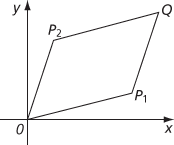An inequality which, in different contexts, takes somewhat different forms but in each case essentially states: ‘The length of a side of a triangle is less than the sum of the lengths of the other sides.’ For example, if z1 and z2 are complex numbers, then
This follows from the fact that |OQ| ≤ |OP1| + |P1Q|, where P1, P2, and Q represent z1, z2, and z1 + z2 in the complex plane.

The parallelogram OP1QP2
Likewise, for vectors a and b,
Finally, the inequality for metric spaces
is also referred to as the triangle inequality. Here a,b,c are points in a metric space and d denotes the metric.
The triangle inequality generalizes naturally to finite and infinite series. For example, and the inequality
for absolutely convergent series. A similar inequality holds for integrals
provided that f and |f| are integrable. See also reverse triangle inequality.
See inequality.
- Virtual Observatory
- virtual particle
- virtual private network
- virtual reality
- Virtual Reality Modeling Language
- virtual reality systems
- virtual safe deposit box
- virtual screen
- virtual state
- virtual store front
- virtual surround sound
- virtual terminal
- virtual value
- virtual work
- virtual work principle(in mechanics)
- virtual world
- virtue
- virtue epistemology
- virtue ethics
- virulence
- virulence factor
- virus
- virus detection
- virus detection software
- Viruses